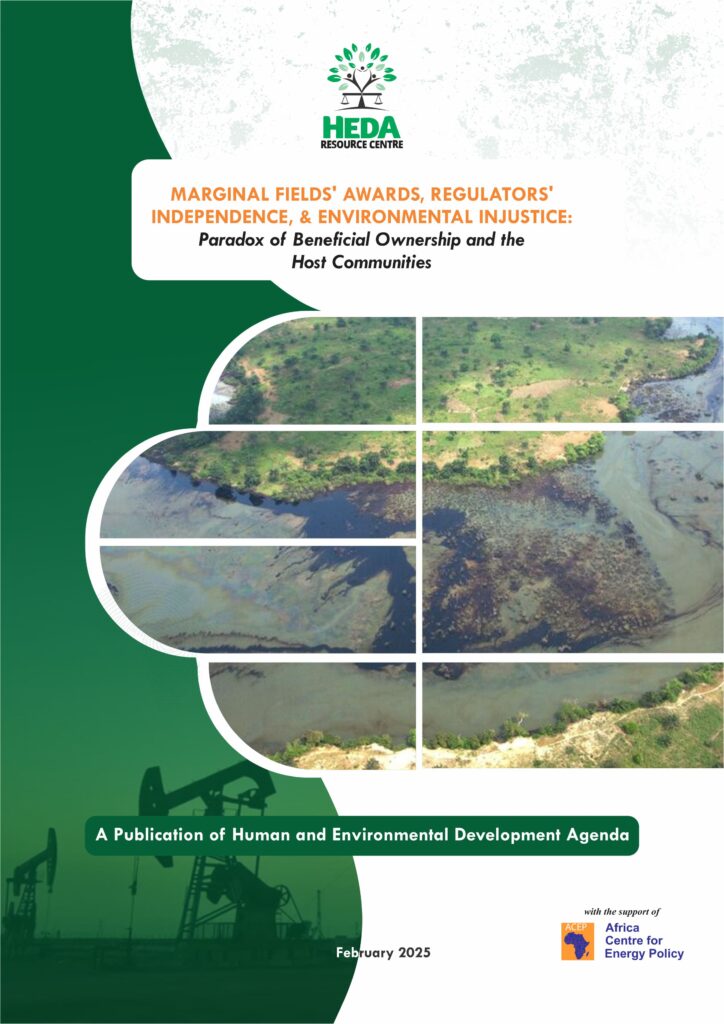As part of its effort to ensure transparency and accountability in the Nigeria’s oil licensing bidding process, the Human and Environmental Development Agenda (HEDA Resource Centre) has exposed serious flaws in Nigeria’s oil licensing process, highlighting regulatory failures, financial misconduct, and environmental injustice in the Niger Delta.
At the public presentation of its latest report in Ikeja, Lagos, HEDA revealed that several companies awarded marginal oil field licenses in the 2020/2021 bidding round lacked proper registration and failed to meet legal and financial requirements.
The report, with the support from Africa Centre for Energy Policy (ACEP), titled “Marginal Fields’ Awards, Regulators’ Independence, and Environmental Injustice: Paradox of Beneficial Ownership and the Host Communities”, also raised concerns over the unchecked environmental damage caused by oil companies.
Chairman, HEDA Resource Centre, Olanrewaju Suraju, condemned the awarding of contracts to unregistered companies, questioning the credibility of Nigeria’s oil sector regulations.
“Out of approximately 38 companies, 18 are not even registered, and many have failed to file their annual returns. This is not about the supply of goods and services; we are talking about Nigeria’s main economic sector,” he said.
He stressed that the failure to enforce due diligence had led to massive revenue losses for the country and called for collaboration between regulatory agencies such as the Corporate Affairs Commission (CAC), the Nigerian Upstream Petroleum Regulatory Commission (NUPRC), and the Nigeria Extractive Industries Transparency Initiative (NEITI).
Beyond financial misconduct, Suraju warned that environmental pollution in the Niger Delta remains a pressing concern. He urged civil society, the diplomatic community, and international organisations to intervene, particularly as oil companies attempt to divest from Nigeria without fulfilling their environmental responsibilities.

The Nigeria Extractive Industries Transparency Initiative (NEITI) Executive Secretary of NEITI, Dr. Ogbonnaya Orji, Dr. Ogbonnaya Orji, commended HEDA’s efforts in promoting transparency and accountability, reaffirming NEITI’s commitment to ensuring responsible resource management.
“Beneficial ownership transparency is not just about knowing who owns what. It is about protecting our nation’s resources from corruption, illicit financial flows, and mismanagement. Host communities must be protected, compensated, and empowered.”
Book Reviewer and Lecturer, University of Lagos, Prof. Dayo Ayoade, criticised the licensing process, describing it as compromised by political influence and corruption.
“The 2020/2021 marginal fields bidding round exhibited procedural abuse and corrupt practices, leading to significant financial losses. Some of the winning companies were owned or backed by politically exposed persons,” he said.
Ayoade added that 11 out of the 35 surveyed companies were inactive under the CAC, while several lacked the tax clearance certificates required for eligibility under the Public Procurement Act 2007.
He further warned that oil companies seeking to exit Nigeria must first be held accountable for their environmental damage.
“Before these companies are allowed to exit, they must remediate the damage done, pay compensation, and fulfill their decommissioning responsibilities.”
You can download the report here



